The Stella Prize is delighted to announce the second-ever Stella Prize shortlist.
From more than 160 entries, this year’s Stella Prize judges – critic and writer Kerryn Goldsworthy (chair); journalist and broadcaster Annabel Crabb; author and academic Brenda Walker; bookseller Fiona Stager; and writer and lecturer Tony Birch – selected a longlist of twelve books, which they have now narrowed down to a shortlist of six. Three works of fiction, three of nonfiction: six great books by Australian women.
Read an extract from each book in the Stella Prize Shortlist Sampler
Watch the Stella Prize Shortlist Videochat
Burial Rites – Hannah Kent (Picador)
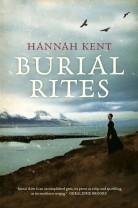 The year is 1828, the place is Iceland, and Agnes Magnúsdóttir has been convicted of murder and condemned to death. Billeted with a local farmer and his family, Agnes wins first the trust and eventually the affection of the family as the time of her death approaches and she muses over the events that have brought her to this place. Strong, sexy and clever, Agnes does not suffer fools gladly and is bitterly regretful that her love for the charismatic murder victim should have sealed her fate.
The year is 1828, the place is Iceland, and Agnes Magnúsdóttir has been convicted of murder and condemned to death. Billeted with a local farmer and his family, Agnes wins first the trust and eventually the affection of the family as the time of her death approaches and she muses over the events that have brought her to this place. Strong, sexy and clever, Agnes does not suffer fools gladly and is bitterly regretful that her love for the charismatic murder victim should have sealed her fate.
The novel is based on a true story, closely following the events surrounding the trial and death of the last woman to be executed in Iceland. Without any labouring of historical detail, the time and place are vividly brought before the reader’s eyes; the plot is cleverly managed, and the characters are powerfully drawn. Unlike many writers who base their novels on real events, Hannah Kent has not allowed her meticulous research to swamp her story or to pull the drama of her narrative out of shape, and the novel is cleverly structured in a series of flashbacks as the true nature of the crime is gradually revealed.
About Hannah Kent
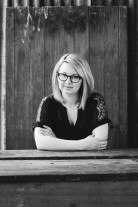 Hannah Kent was born in Adelaide in 1985. As a teenager she travelled to Iceland on a Rotary Exchange, where she first heard the story of Agnes Magnúsdóttir.
Hannah is the co-founder and publishing director of Australian literary journal Kill Your Darlings, and is completing her PhD at Flinders University. In 2011 she won the inaugural Writing Australia Unpublished Manuscript Award. Burial Rites is her first novel. It has been translated into twenty languages.
Hannah Kent was born in Adelaide in 1985. As a teenager she travelled to Iceland on a Rotary Exchange, where she first heard the story of Agnes Magnúsdóttir.
Hannah is the co-founder and publishing director of Australian literary journal Kill Your Darlings, and is completing her PhD at Flinders University. In 2011 she won the inaugural Writing Australia Unpublished Manuscript Award. Burial Rites is her first novel. It has been translated into twenty languages.
Read an extract from Burial Rites here
Read the Stella Interview with Hannah Kent here
Night Games: Sex, Power and Sport – Anna Krien (Black Inc)
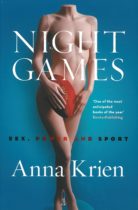 Following in the footsteps of Truman Capote, Janet Malcolm and, closer to home, Helen Garner, Anna Krien explores the facts, the claims and the ramifications surrounding a court case in which a Melbourne footballer was tried for the rape of a young woman. Anna Krien follows the arguments and assumptions that are made as the trial unfolds, her discussion spreading out in circles of argument and questioning to examine the wider contexts of this story. Krien’s interrogation of her own relationship to the events she is recording, and the validity of her role as reporter and commentator, is a part of this book’s achievement in opening up questions and judgements about the case rather than closing them down.
Following in the footsteps of Truman Capote, Janet Malcolm and, closer to home, Helen Garner, Anna Krien explores the facts, the claims and the ramifications surrounding a court case in which a Melbourne footballer was tried for the rape of a young woman. Anna Krien follows the arguments and assumptions that are made as the trial unfolds, her discussion spreading out in circles of argument and questioning to examine the wider contexts of this story. Krien’s interrogation of her own relationship to the events she is recording, and the validity of her role as reporter and commentator, is a part of this book’s achievement in opening up questions and judgements about the case rather than closing them down.
The book does not merely examine the trial and the events leading up to it, but, more significantly, uses that particular story as a way of engaging with wider contemporary debates about rape and consent, as well as about the powerful sub-cultures of the big football codes, and the attitudes to women that predominate there. Krien deftly and lucidly explores the grey areas: between experience and memory, between consent and rape, between the law and justice. While Krien maintains no pretence of objectivity about these issues or the perceptions, emotions and vulnerabilities of everyone concerned, she manages to step back from the action at each point to examine every facet of the trial itself and its wider implications: for the media, for society, for sport and for women.
About Anna Krien
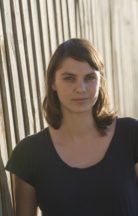 Anna Krien is the author of Night Games, Into the Woods and Quarterly Essay 45 Us and Them. Her work has been published in the Monthly, the Age, the Big Issue, The Best Australian Essays, The Best Australian Stories, Griffith Review, Voiceworks, Going Down Swinging, Colors, Frankie and Dazed & Confused.
Anna Krien is the author of Night Games, Into the Woods and Quarterly Essay 45 Us and Them. Her work has been published in the Monthly, the Age, the Big Issue, The Best Australian Essays, The Best Australian Stories, Griffith Review, Voiceworks, Going Down Swinging, Colors, Frankie and Dazed & Confused.
Read an extract from Night Games here
Read the Stella Interview with Anna Krien here
The Night Guest – Fiona McFarlane (Penguin)
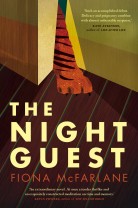 This is a remarkable debut novel that recalls the classic Australian TV series Mother and Son in the way it uses humour to soften the reality of dementia. Ruth at 75, widowed when her husband dies suddenly of a heart attack, is living alone in their house on the New South Wales coast when one night she’s woken by noises in the house. What she can hear, she thinks, is a tiger in the living room. This is the beginning of Ruth’s decline, and from that point neither she nor the reader is ever entirely sure of what is real and what is imaginary. The story explores Ruth’s consciousness in an empathetic and imaginative way, showing us how the world looks from inside her mind.
This is a remarkable debut novel that recalls the classic Australian TV series Mother and Son in the way it uses humour to soften the reality of dementia. Ruth at 75, widowed when her husband dies suddenly of a heart attack, is living alone in their house on the New South Wales coast when one night she’s woken by noises in the house. What she can hear, she thinks, is a tiger in the living room. This is the beginning of Ruth’s decline, and from that point neither she nor the reader is ever entirely sure of what is real and what is imaginary. The story explores Ruth’s consciousness in an empathetic and imaginative way, showing us how the world looks from inside her mind.
McFarlane takes the long history of the tiger as a literary symbol and uses it in a mercurial way to anchor her story of Ruth’s relationship with Frida, who simply turns up one morning claiming she’s been ‘sent by the government’ to act as Ruth’s carer. The two women’s relationship has its swings and roundabouts, with each needing the other and elements of folie à deux creeping into their increasingly strange connection. Frida turns out to be not what she seems, and in her own way is as ambiguous and potentially deadly as the tiger itself. The themes of exploitation and invasion are subtly woven into the main story of ageing and decline, and McFarlane uses the symbolic and the surreal in ways that linger in the reader’s mind long after the book is closed.
About Fiona McFarlane
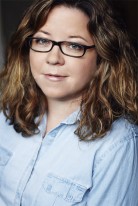 Fiona McFarlane was born in Sydney, and has degrees in English from Sydney University and Cambridge University, and an MFA from the University of Texas at Austin, where she was a Michener Fellow. Her work has been published in Zoetrope: All-Story, Southerly, the Best Australian Stories and the New Yorker. The Night Guest, her debut novel, has sold into fifteen territories around the world.
Fiona McFarlane was born in Sydney, and has degrees in English from Sydney University and Cambridge University, and an MFA from the University of Texas at Austin, where she was a Michener Fellow. Her work has been published in Zoetrope: All-Story, Southerly, the Best Australian Stories and the New Yorker. The Night Guest, her debut novel, has sold into fifteen territories around the world.
Read an extract from The Night Guest here
Read the Stella Interview with Fiona McFarlane here
Boy, Lost: A Family Memoir – Kristina Olsson (UQP)
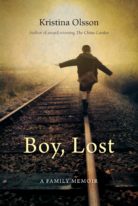 Kristina Olsson’s story of her half-brother Peter, stolen by his father from his mother’s arms, is a beautifully understated family memoir in which the writer barely features: this is the story of Peter and his mother. Told compassionately and even-handedly, it follows Peter from his birth in 1948 through a difficult childhood of abuse, illness and homelessness, a gradual finding of his adult feet, an eventual reunion with his mother, and its less than happy aftermath. It also tracks the life of Peter and Kristina’s mother, Yvonne, showing her caught up in a situation she could neither understand nor control.
Kristina Olsson’s story of her half-brother Peter, stolen by his father from his mother’s arms, is a beautifully understated family memoir in which the writer barely features: this is the story of Peter and his mother. Told compassionately and even-handedly, it follows Peter from his birth in 1948 through a difficult childhood of abuse, illness and homelessness, a gradual finding of his adult feet, an eventual reunion with his mother, and its less than happy aftermath. It also tracks the life of Peter and Kristina’s mother, Yvonne, showing her caught up in a situation she could neither understand nor control.
The book reflects the social history of Australia in the 1950s: the lack of accountability in cases of domestic violence, the tolerance of gambling, the lack of freedom that was women’s lot in the decade before the Pill and the rise of second-wave feminism, the ravages of the polio epidemic. Peter’s childhood is shaped first by the cultural tensions of a Greek–Australian marriage in the wave of postwar immigration, and then by the effects of polio, which he contracts only a couple of years before the availability of the vaccine that would have saved him. Much of the power of this book lies in the way that it reflects the fates of all children lost to a parent or parents, whether through familial dysfunction, government policy or personal tragedy, and that lifts it beyond the level of merely personal memoir to give it some of the force of fable and folktale.
About Kristina Olsson
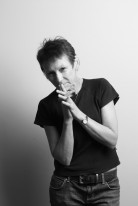 Kristina Olsson is the author of two novels, In One Skin and the award-winning The China Garden, and the biography Kilroy Was Here. Her stories and journalism have appeared in Griffith Review, The Australian Weekend Magazine, QWeekend, Women of Letters II and Grandma Magic. Boy, Lost is a family memoir that recounts the theft of her mother’s first child. Kristina lives in Brisbane and is working on her third novel.
Kristina Olsson is the author of two novels, In One Skin and the award-winning The China Garden, and the biography Kilroy Was Here. Her stories and journalism have appeared in Griffith Review, The Australian Weekend Magazine, QWeekend, Women of Letters II and Grandma Magic. Boy, Lost is a family memoir that recounts the theft of her mother’s first child. Kristina lives in Brisbane and is working on her third novel.
Read an extract from Boy, Lost here
Read the Stella Interview with Kristina Olsson here
The Swan Book – Alexis Wright (Giramondo)
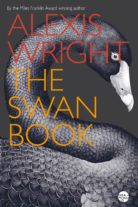 A hundred years into the future, when climate change has irreparably damaged the earth, a refugee from the frozen northern hemisphere called Bella Donna finds a mute teenage girl she names Oblivia and takes her to live with her on an old derelict warship in a dry, polluted swamp in northern Australia. Three new figures appear: a black swan, an Aboriginal elder who looks like Mick Jagger, and an archangel in a white Commodore. These five creatures anchor Alexis Wright’s brilliantly surreal and inventive novel about imagination and the power of story. It’s a treasure chest of stories, fables, songs, myths and poems, containing a wealth of cultural references from across the globe. The Swan Book is also a furious and impassioned political fable, linking the fate of Aboriginal Australia to the trajectory of unstoppable global warming and employing the fathomless complexity of the living Aboriginal relationship to country as a way of exploring humanity’s connection to the earth.
A hundred years into the future, when climate change has irreparably damaged the earth, a refugee from the frozen northern hemisphere called Bella Donna finds a mute teenage girl she names Oblivia and takes her to live with her on an old derelict warship in a dry, polluted swamp in northern Australia. Three new figures appear: a black swan, an Aboriginal elder who looks like Mick Jagger, and an archangel in a white Commodore. These five creatures anchor Alexis Wright’s brilliantly surreal and inventive novel about imagination and the power of story. It’s a treasure chest of stories, fables, songs, myths and poems, containing a wealth of cultural references from across the globe. The Swan Book is also a furious and impassioned political fable, linking the fate of Aboriginal Australia to the trajectory of unstoppable global warming and employing the fathomless complexity of the living Aboriginal relationship to country as a way of exploring humanity’s connection to the earth.
If Wright’s last novel Carpentaria – the winner of the 2007 Miles Franklin Literary Award – was operatic in its scope and language, then The Swan Book is even more so. Rich and deep in its imagery, fearless in its linguistic acrobatics and sweeping in its imaginative power, The Swan Book is at once a futuristic dystopia, a gorgeous artifact, and an urgent call to action.
About Alexis Wright
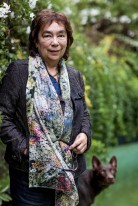 Alexis Wright is a member of the Waanyi nation of the southern highlands of the Gulf of Carpentaria. Her books include Grog War, a study of alcohol abuse in Tennant Creek, and the novels Plains of Promise, and Carpentaria, which won the Miles Franklin Literary Award, the Victorian and Queensland Premiers’ Awards and the ALS Gold Medal, and was published in the US, UK, China, Italy, France, Spain and Poland. She is a Distinguished Fellow in the University of Western Sydney’s Writing and Society Research Centre.
Alexis Wright is a member of the Waanyi nation of the southern highlands of the Gulf of Carpentaria. Her books include Grog War, a study of alcohol abuse in Tennant Creek, and the novels Plains of Promise, and Carpentaria, which won the Miles Franklin Literary Award, the Victorian and Queensland Premiers’ Awards and the ALS Gold Medal, and was published in the US, UK, China, Italy, France, Spain and Poland. She is a Distinguished Fellow in the University of Western Sydney’s Writing and Society Research Centre.
Read an extract from The Swan Book here
Read the Stella Interview with Alexis Wright here
The Forgotten Rebels of Eureka – Clare Wright (Text)
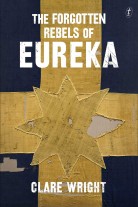 This study of the role of women on the Ballarat goldfields in the years leading up to the Eureka Stockade is a rare and irresistible combination of impeccable scholarship with a lively, warm, engaging narrative voice that, along with a wealth of intriguing detail about daily life on the goldfields, makes this book compulsively readable.
This study of the role of women on the Ballarat goldfields in the years leading up to the Eureka Stockade is a rare and irresistible combination of impeccable scholarship with a lively, warm, engaging narrative voice that, along with a wealth of intriguing detail about daily life on the goldfields, makes this book compulsively readable.
Clare Wright offers a genuinely new historical perspective on Eureka. Traditionally represented as a key moment in the forging of Australian masculinity, the conflict and the events that led up to it involved a number of women, both directly and indirectly. Far from the usual image of a wild shantytown with an all-male population, the book reveals a relatively ordered goldfields society where commerce, domestic life and even theatre all flourished. The book makes extensive use of contemporary newspapers and journals, whose advertising reveals a thriving female culture: dances and balls where childcare was provided, and breast pumps for nursing mothers. It also makes use of private journals and letters, which are always a productive and revealing source of information about the people who usually get written out of the official records and histories. Clare Wright does not attempt to discredit existing versions of events, but rather to enrich and deepen our knowledge of Eureka and our understanding of its place in Australian history and society.
About Clare Wright
 Clare Wright is an historian who has worked as a political speechwriter, university lecturer, historical consultant, and radio and television broadcaster. Her first book, Beyond the Ladies Lounge: Australia’s Female Publicans, garnered both critical and popular acclaim. She researched, wrote and presented the ABC television documentary Utopia Girls and is currently writing a four-part series to commemorate the centenary of WWI for ABC1. She lives in Melbourne with her husband and three children.
Clare Wright is an historian who has worked as a political speechwriter, university lecturer, historical consultant, and radio and television broadcaster. Her first book, Beyond the Ladies Lounge: Australia’s Female Publicans, garnered both critical and popular acclaim. She researched, wrote and presented the ABC television documentary Utopia Girls and is currently writing a four-part series to commemorate the centenary of WWI for ABC1. She lives in Melbourne with her husband and three children.
Read an extract from The Forgotten Rebels of Eureka here
The 2014 Stella Prize will be awarded in Sydney on the evening of Tuesday 29 April. The winner will receive $50,000. Additionally, and for the first time, the other five shortlisted authors will also receive prize money of $2000, courtesy of the Nelson Meers Foundation. This carries forward the extraordinary gesture of the inaugural Stella Prize winner, Carrie Tiffany, who last year shared $10,000 of her prize money with her fellow shortlisted authors.

